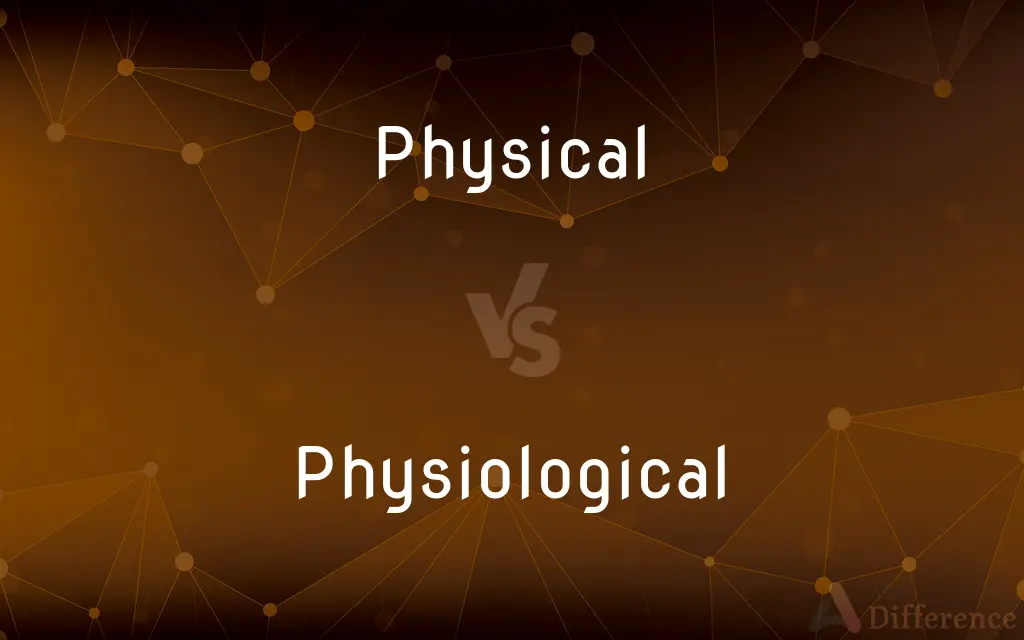Physical vs. Physiological — What's the Difference?
By Urooj Arif & Fiza Rafique — Updated on March 11, 2024
Physical refers to the tangible, bodily aspects of entities, emphasizing structure and form, while physiological pertains to the functions and processes of living organisms and their parts.

Difference Between Physical and Physiological
Table of Contents
ADVERTISEMENT
Key Differences
Physical attributes or aspects relate to the body's external and internal structure, including anatomy and physical properties like strength and flexibility. These characteristics can be observed, measured, and often seen or touched. On the other hand, physiological aspects focus on the biological and biochemical processes that enable living organisms to grow, reproduce, sustain their structures, and respond to their environments. This includes metabolism, homeostasis, and hormonal functions, which are not visible to the naked eye but are crucial for life.
While physical health is often assessed through observable metrics such as body composition, endurance, and physical ability, physiological health delves into the functionality of body systems, such as cardiovascular health, respiratory efficiency, and neurological functions. Whereas physical exercises aim to improve strength, endurance, and overall body condition, physiological health can be influenced by a wider range of factors including genetics, diet, and environmental conditions.
In the realm of education and professions, physical education focuses on enhancing physical fitness and motor skills through activities like sports and exercise. Conversely, physiology as a discipline explores the mechanisms of body functions, aiming to understand how organisms, organ systems, tissues, cells, and biomolecules carry out the chemical or physical functions that exist in a living system.
The assessment of physical and physiological aspects can differ significantly. Physical assessments might include measurements of height, weight, muscle mass, and physical capabilities. Physiological assessments, however, often require more complex methodologies such as electrocardiograms (ECGs), and other diagnostic tests to evaluate the functioning of various body systems.
Physical improvements are often visible and tangible, such as increased muscle size or decreased body fat percentage. In contrast, physiological improvements, like enhanced insulin sensitivity or body pressure, are internal and may require medical tests to verify, highlighting the distinction between external changes and internal health advancements.
ADVERTISEMENT
Comparison Chart
Focus
Body's structure and form
Body's functions and processes
Examples
Muscle strength, flexibility
Metabolism, homeostasis
Health Assessment
Observable metrics (e.g., body composition)
Functionality of body systems
Education/Profession
Physical education, personal training
Physiology, biomedical research
Assessment Methods
Measurements, physical tests
ECGs, diagnostic tests
Visible Improvements
Yes (e.g., muscle size, body fat)
No (internal health advancements)
Influencing Factors
Exercise, nutrition
Genetics, diet, environment
Observable/Measurable
Often observable and measurable
Requires specific tests for evaluation
Compare with Definitions
Physical
Relating to material things or objects.
The physical properties of materials determine their strength.
Physiological
Involves biochemical and physical processes.
The physiological impact of stress can affect overall health.
Physical
Can be seen or touched.
The sculpture's physical form was admired by all.
Physiological
Involving the processes that support life.
Breathing is a physiological process necessary for oxygen exchange.
Physical
Involving bodily activities.
Regular physical activity can improve your health and reduce the risk of developing diseases.
Physiological
Related to the functions of living organisms and their parts.
Physiological studies help understand human body functions.
Physical
Concerned with the laws of nature.
Physical laws govern the motion of planets.
Physiological
Concerned with normal body functions.
Physiological responses to exercise include increased heart rate and sweating.
Physical
Pertaining to the body and its structures.
Physical fitness is crucial for overall health.
Physiological
Pertaining to the branch of biology that deals with the normal functions of living organisms.
Physiology is a key subject in medical education.
Physical
Relating to the body as opposed to the mind
A range of physical and mental challenges
Physiological
Of or relating to physiology.
Physical
Relating to things perceived through the senses as opposed to the mind; tangible or concrete
The physical world
Physiological
Being in accord with or characteristic of the normal functioning of a living organism.
Physical
Relating to physics or the operation of natural forces generally
Physical laws
Physiological
Of, or relating to physiology.
Physical
A medical examination to determine a person's bodily fitness
At fifty-something, each year's physical was a kind of lottery
Physiological
Relating to the action of a drug when given to a healthy person, as distinguished from its therapeutic action.
Physical
Stocks held in actual commodities for immediate exchange, for example as opposed to futures
The exchange of futures for physicals
Physiological
Of or pertaining to physiology; relating to the science of the functions of living organism; as, physiological botany or chemistry.
Physical
Of or relating to the body.
Physiological
Of or relating to the biological study of physiology;
Physiological psychology
Pavlov's physiological theories
Physical
Having a physiological basis or origin
A physical craving for an addictive drug.
Physiological
Of or consistent with an organism's normal functioning;
Physiologic functions
Physiological processes
Physical
Involving or characterized by vigorous or forceful bodily activity
Physical aggression.
A fast and physical dance performance.
Physical
(Slang) Involving or characterized by violence
"A real cop would get physical" (TV Guide).
Physical
Of or relating to material things
A wall that formed a physical barrier.
The physical environment.
Physical
Of or relating to matter and energy or the sciences dealing with them, especially physics.
Physical
A physical examination.
Physical
Of medicine.
Physical
(obsolete) Pertaining to the field of medicine; medical.
Physical
(obsolete) That practises medicine; pertaining to doctors, physicianly.
Physical
(obsolete) Medicinal; good for the health, curative, therapeutic.
Physical
Of matter or nature.
Physical
Pertaining to the world as understood through the senses rather than the mind; tangible, concrete; having to do with the material world.
It's not so much a physical place as a state of mind.
Physical
In accordance with the laws of nature; now specifically, pertaining to physics.
The substance has a number of interesting physical properties.
Physical
Denoting a map showing natural features of the landscape (compare political).
Physical
Of the human body.
Physical
Having to do with the body as opposed to the mind; corporeal, bodily.
Are you feeling any physical effects?
Physical
Involving bodily force or contact; vigorous, aggressive.
This team plays a very physical game, so watch out.
Physical
Physical examination.
How long has it been since your last physical?
Physical
(parapsychology) A physical manifestation of psychic origin, as through ectoplasmic solidification.
Physical
Of or pertaining to nature (as including all created existences); in accordance with the laws of nature; also, of or relating to natural or material things, or to the bodily structure, as opposed to things mental, moral, spiritual, or imaginary; material; natural; as, armies and navies are the physical force of a nation; the body is the physical part of man.
Labor, in the physical world, is . . . employed in putting objects in motion.
A society sunk in ignorance, and ruled by mere physical force.
Physical
Of or pertaining to physics, or natural philosophy; treating of, or relating to, the causes and connections of natural phenomena; as, physical science; physical laws.
Physical
Perceptible through a bodily or material organization; cognizable by the senses; external; as, the physical, opposed to chemical, characters of a mineral.
Physical
Of or pertaining to physic, or the art of medicine; medicinal; curative; healing; also, cathartic; purgative.
Is Brutus sick? and is it physicalTo walk unbraced, and suck up the humorsOf the dank morning?
Physical
Involving the body as distinguished from the mind or spirit;
Physical exercise
Physical suffering
Was sloppy about everything but her physical appearance
Physical
Relating to the sciences dealing with matter and energy; especially physics;
Physical sciences
Physical laws
Physical
Having substance or material existence; perceptible to the senses;
A physical manifestation
Surrounded by tangible objects
Physical
According with material things or natural laws (other than those peculiar to living matter);
A reflex response to physical stimuli
Physical
Characterized by energetic bodily activity;
Tennis is an active sport
A very physical dance performance
Physical
Concerned with material things;
Physical properties
The physical characteristics of the earth
The physical size of a computer
Physical
Impelled by physical force especially against resistance;
Forcible entry
A real cop would get physical
Strong-arm tactics
Common Curiosities
How do physical and physiological assessments differ?
Physical assessments often involve observable metrics like body composition, whereas physiological assessments require diagnostic tests to evaluate body functions.
Are physiological processes observable?
Most physiological processes are internal and not directly observable, requiring specific tests for assessment.
Can improvements in physiological health be seen?
Improvements in physiological health are internal and may not be visible but can significantly enhance overall well-being and function.
Can physical health affect physiological health?
Yes, physical health can directly impact physiological health; for example, regular exercise can improve heart function and metabolism.
What role does genetics play in physiological health?
Genetics play a crucial role in physiological health, affecting the efficiency of metabolic processes and susceptibility to certain diseases.
What is a common method for assessing physiological health?
Common methods include blood tests, which can reveal a lot about physiological health, including organ function and metabolic state.
How does stress affect physiological health?
Stress can have negative effects on physiological health, including raising blood pressure and altering hormone levels.
What is the main difference between physical and physiological?
Physical refers to the body's structure and form, while physiological pertains to the functions and processes of living organisms.
Can physical activities improve physiological functions?
Yes, physical activities can improve physiological functions such as cardiovascular efficiency, respiratory function, and metabolic rate.
How does diet affect physical and physiological health?
Diet has a profound impact on both physical and physiological health, influencing body composition, metabolism, and organ function.
Is physical education the same as studying physiology?
No, physical education focuses on physical fitness and motor skills, while physiology studies the body's functions and processes.
What is the significance of understanding both physical and physiological aspects for health?
Understanding both provides a comprehensive view of health, highlighting the importance of both physical condition and internal body functions.
How is physiological research conducted?
It involves experiments and studies on bodily functions, often using lab tests, animal models, and clinical trials.
Can physiological problems manifest as physical symptoms?
Yes, physiological issues can lead to physical symptoms, such as fatigue or changes in weight.
What is the impact of aging on physical and physiological health?
Aging can lead to declines in both physical strength and physiological functions, emphasizing the need for proactive health management.
Share Your Discovery

Previous Comparison
Heading vs. Yaw
Next Comparison
Responsible vs. TrustworthyAuthor Spotlight
Written by
Urooj ArifUrooj is a skilled content writer at Ask Difference, known for her exceptional ability to simplify complex topics into engaging and informative content. With a passion for research and a flair for clear, concise writing, she consistently delivers articles that resonate with our diverse audience.
Co-written by
Fiza RafiqueFiza Rafique is a skilled content writer at AskDifference.com, where she meticulously refines and enhances written pieces. Drawing from her vast editorial expertise, Fiza ensures clarity, accuracy, and precision in every article. Passionate about language, she continually seeks to elevate the quality of content for readers worldwide.














































